Ethiopia tackles ghosts of elections past
- Published
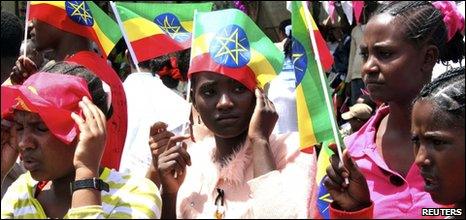
The ruling party faces its first real challenge in almost two decades
Ethiopians prepare to vote in a national election on Sunday with the memories of a 2005 election blighted by violence and rigging allegations fresh in their minds, as the BBC's Uduak Amimo in Addis Ababa reports.
Prime Minister Meles Zenawi took over the country's leadership in 1991 and has held it ever since.
His reputation inside and outside his country is a big one - he is the African Union's spokesman on climate change and he was one of the African leaders who served on the former British Prime Minister Tony Blair's Commission for Africa.
The Horn of Africa is an unstable neighbourhood and Mr Meles has been a reliable Western ally in containing both Somalia and Eritrea; international aid has continued to flow into his country.
Old comrades, new foes
But he faces growing internal opposition and criticism of his record and policies.
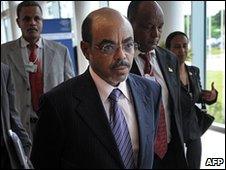
Meles Zenawi has a big reputation at home and abroad
For the first time, he faces a challenge in his Tigray province constituency of Adwa - from 56-year-old Aregash Adane, a former colleague in the liberation struggle.
At one time she was the most senior woman in the Tigray People's Liberation Front (TPLF) which is the main party in the governing Ethiopian Peoples Revolutionary Democratic Front (EPRDF) coalition.
But she is now running under the opposition Arena-Tigray banner, which has put up candidates in most of the 38 constituencies in Tigray.
Embassy warning
The role of donors - aid groups and Western countries - in Africa's second most populous country has also been questioned by international human rights groups which accuse them of turning a blind eye to violations.
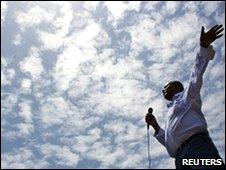
Merera Gudina claims his campaign has been obstructed
Relations between the European Union and Ethiopia took some time to recover after the head of the observer mission to the 2005 election, Ana Gomez, concluded that those polls had failed to meet international standards.
The EU is again observing this election, along with the African Union.
Local embassies including the US - Ethiopia's biggest donor - have been warned against attempting to observe the elections themselves.
The government says it does not want its bilateral relations complicated by electoral hassles.
Non-lethal force
And Mr Meles says he has taken every precaution to ensure that Sunday's vote does not descend into the violent protests that broke out during the 2005 parliamentary election, which claimed the lives of 200 civilians and seven policemen.
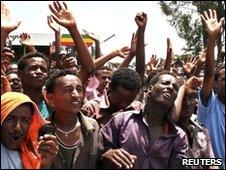
Opposition supporters are hopeful they can unseat the government
Several opposition leaders were imprisoned for life after the 2005 poll. Although they were later pardoned and released, one of them - Birtukan Mideksa - was rearrested and remains in jail for reportedly violating the terms of the pardon.
This time, security forces have been trained and, according to Communications Minister Bereket Simon, have been ordered to use non-lethal force to quell any disturbances.
The government points to the introduction of public financing for opposition parties as a sign of progress.
But this has not convinced the opposition.
'Donor democracy'
More than 60 parties are contesting the polls, eight of them have formed a coalition known as the Forum for Federal Democratic Unity, or Medrek in the national Amharic language.
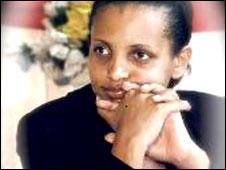
People have protested over Birtukan Medeksa's imprisonment
They claim that their members and supporters are being intimidated, harassed and even killed. Their leader Merera Gudina says his campaigns in the most populous Oromiya region are being obstructed by ruling party sympathisers.
Medrek is seen as the most potent opposition force in the country at the moment - it is fielding the second-largest number of candidates after the EPRDF.
But it refused to sign up to the country's first-ever political parties code of conduct, dismissing it as a sham and an attempt at shoring up Ethiopia's "donor democracy".
Ethiopia's government says that it has investigated the opposition's complaints and found them baseless.
Claim, counter-claim
The government accuses the opposition of using the foreign media to air their grievances instead of attempting to address them internally.
Officials also claim that the opposition are provoking incidents to trigger public backlashes - which Mr Bereket says was the reason behind the killing of a policeman in the Oromiya region in May.
He says that the suspects had implicated Mr Merera, who has since denied the allegation.
For the EPRDF, this election is about winning a renewed mandate to continue their ambitious rapid industrialisation programme.
Ethiopia is one of Africa's fastest growing economies, despite the widespread association with famine, which the government and many Ethiopians resent.
Much of that growth is based on agriculture, coffee and wheat. Foreign investors, from countries such as China, India and Turkey, are now being drawn to the country by huge tracts of farming land on lease as well as oil and gas reserves in the south.
The final results are expected to be announced on 21 June. People in Addis Ababa says they do not expect any surprises; the ruling party will win.